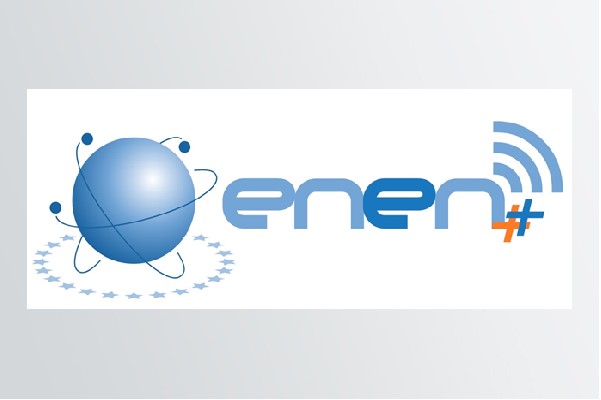The European Nuclear Education Network, (ENEN) is an international nonprofit organization (aisbl) established under the Belgian law. The main purpose of the ENEN Association is the preservation and the further development of expertise in the nuclear fields by higher education and training in Europe. This objective is realized through the co-operation between universities, research organisations, regulatory bodies, the industry and any other organisations involved in the application of nuclear science and ionising radiation.
Legal data
ENEN has currently two offices; one situated in Brussels and the second office in Geel, Belgium, hosted by the Joint Research Center of the European Commission. The official address is: ENEN, Rue d’Egmont 11,1000 Brussels, Belgium.
The company registration number as international non profit association is BE0687.994.274 (link to the Belgian official registry).
General objectives
The general objectives of the ENEN Association are defined as follows:
With respect to the Academia:
- to develop a more harmonized approach for education in the nuclear sciences and nuclear engineering in Europe;
- to integrate European education and training in nuclear safety and radiation protection; and
- to achieve better co-operation and sharing of academic resources and capabilities at the national and international level.
With respect to the End Users, such as nuclear industries, research centers, regulatory bodies and nuclear applications:
- to create a secure basis of skills and knowledge of value to the EU;
- to maintain an adequate supply of qualified human resources for design, construction, operation and maintenance of nuclear infrastructures, industries and power plants; and
- to maintain the necessary competence and expertise for the continued safe use of nuclear energy and applications of radiation and nuclear techniques in agriculture, industry and medicine.
Particular objectives
- Promote and further develop the collaboration in nuclear education and training of students, researchers and professionals,
- Ensure the quality of nuclear education and training,
- Increase the attractiveness for engagement in the nuclear fields for students, researchers and professionals.
- Promote life-long learning and career development at post-graduate or equivalent level.
Other basic objectives of the ENEN Association are to:
- Harmonise European Master of Science curricula in nuclear disciplines and promote PhD studies,
- Promote exchange of students and teachers participating in the frame of this network,
- Increase the number of students by providing incentives,
- Establish a framework for mutual recognition,
- Foster and strengthen the relationship between universities, research organisations, regulatory bodies,the industry and any other organisations involved in the application of nuclear science and ionising radiation by facilitating their participation in (or associating them with) nuclear academic education and by offering continuous training.
Actions
Actions towards the Academia:
- Assist universities to attract young and brilliant students by:
– identifying, developing and disseminating new and challenging subjects for research;
– establishing links and cooperation with research centres; - Convince universities to recruit new academic members for teaching and research in nuclear disciplines and maintaining expertise in key nuclear areas by:
– developing, promoting and supporting ENEN exchange courses in nuclear disciplines;
– disseminating and supporting the concept of life long learning in nuclear disciplines;
– facilitate and coordinate the participation of universities to European research projects.
Actions towards End-Users:
- Conserve the nuclear knowledge and improve the expertise by developing and establishing databases, web sites and distance learning tools;
- Define the goals and set up the criteria for professional recognition and recruitment throughout the EU;
- Provide resources and lecturers for advanced training courses, professional upgrades and continual training programmes;
- Identify, disseminate and support interesting projects and research topics for internships, master theses and PhDs.
Historical background
Historically, ENEN was initially established as a French association called “Réseau Européen pour l’Enseignement des Sciences Nucléaires-ENEN” (ENEN Association), a nonprofit association established on 22 September 2003 under the French Law.
On 28 September 2018, the association transferred its activities to Brussels, Belgium. During this international legal reestructuring, the international nonprofit organization (aisbl) entity “European Nuclear Education Network” absorbed the activities of the french association “Réseau Européen pour l’Enseignement des Sciences Nucléaires-ENEN”, taking place at the same time the conclusion of activity of the latest.
The “European Nuclear Engineering Network” project was launched under the 5th framework programme of the European Commission in January 2002. It established the basis for conserving nuclear knowledge and expertise, created a European High Education Area for nuclear disciplines, and initiated the implementation of the Bologna declaration in nuclear disciplines.
The European Nuclear Education Network (ENEN) Association was established afterwards on the basis of the European High Education Area by the partners of the “European Nuclear Engineering Network” project. The ENEN was given a more permanent character and a legal status by the foundation of the ENEN Association, a nonprofit international organization on 22 September 2003 under the French law of 1901.
The Lisbon EU 2000 summit proposed the strategic goal for the European Union to become the most competitive knowledge-based economy with more and better employment and social cohesion by 2010. It says: “Although the number of nuclear scientist and technologist may appear to be sufficient today in some countries, there are indicators that future expertise is at risk. In most countries, there are now fewer comprehensive, high quality nuclear technology programmes at universities than before. The ability of universities to attract top quality students, meet future staffing requirements of the nuclear industry, and conduct leading-edge research is becoming seriously compromised.”


